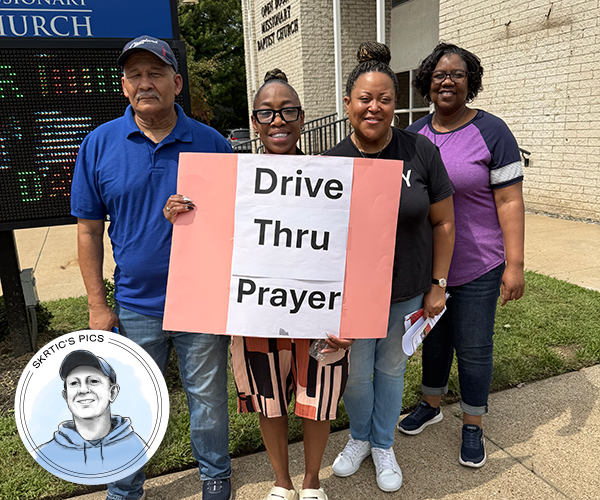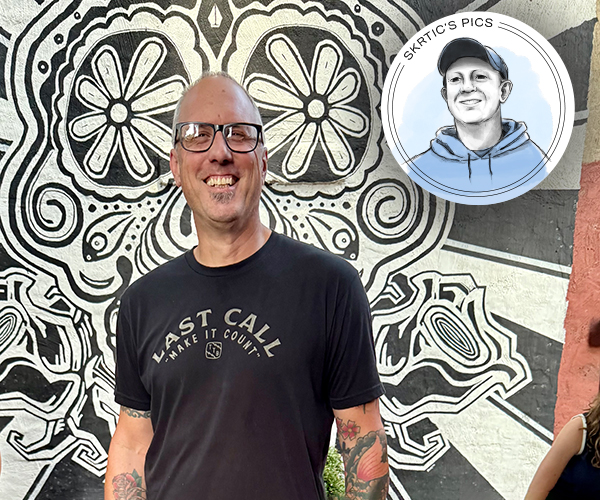Elizabeth Kucinich walks into Sahara Restaurant with two bouquets of daisies. Her red hair hangs loose, waist long. She’s been in this country a mere seven months. Living in Cleveland less than three.
But, already, this is her place, these are her people.
Usually, she walks the half mile from her house to this restaurant near the intersection of Lorain Avenue and West 117th Street, but today she drove so she could stop at the florist. She rushes over to the woman behind the counter, stoops down, kisses her cheek and gives her the flowers, saying “Happy Eid, Mama.” The other bouquet is for the woman’s daughter, who owned a beauty salon in Jordan for 25 years before coming to the United States — a happy discovery for Elizabeth, who was looking for someone to do her hair for her Aug. 21, 2005, wedding to Dennis Kucinich.
By now, most of us have heard of — and been intrigued by — the love story of the Englishwoman and the congressman. The contrasts are too great to go unnoticed: He’s 59; she’s 28. This is his third marriage; it’s her first. She grew up outside London; he’s been a Clevelander all his life. Her height and beauty had some of her family encouraging her to be a model. Even wearing jeans, her poise, posture and perfect features give her an almost regal look. It’s a fair guess that no one has ever used that same adjective to describe Dennis.
Add actors Shirley MacLaine and Sean Penn as wedding guests, and you’ve got one of the more interesting unions to hit Cleveland in years.
Elizabeth has been described by a Washington, D.C., newspaper as a “bombshell,” but for some reason the word doesn’t quite fit. Clearly, she’s beautiful, but not in the way that makes women jealous or men drool.
Maybe it’s her lilting English accent or maybe it’s the fact that “Mama” has come over and is stroking her hair as if it’s good luck just to touch her, but Elizabeth comes off more fairy godmother than femme fatale. She laughs often and doesn’t hesitate when asked if she is generally a happy person. “Oh yeah, absolutely.”
This is only the second interview she’s done in her life, but she appears completely relaxed, sipping on a smoothie. Maybe she’s already used to being famous in Cleveland. Even before The Plain Dealer did a front page story on her marriage, she says she was recognized, whether or not Dennis was by her side. Now, she says, walking down the street “is like running a gauntlet.” So far, it’s been fun.
While you’d be correct if you assume that, because she married Dennis, she’s liberal, Elizabeth is quick to point out that she’s not some “starstruck girl” who enjoys playing the role of wife to a one-time presidential candidate. In fact, she says she hasn’t yet begun the rounds of D.C. power parties and fund-raisers. It’s not the kind of thing that gets her going. “I’m more a hands-on person in helping people,” she says.
So is she a hippie, as one local weekly alleged? “If a hippie means that you love your environment, that you respect people and you want people to live in peace, then I’m a hippie,” she says.
“But I’ve never smoked drugs,” she continues, laughing. “And I’ve never been to a music festival.”
One of the things she likes about Dennis is that he is proof that a person doesn’t have to lose their idealism as they age. “Everybody said, when I was at school, ‘You’ll grow out of it. You’ll grow out of it.’ And it’s so lovely because now I’m married to someone who is 31 years older than me and is as idealistic as I am.”
You won’t, however, find Elizabeth saving whales or palling around the globe with Bono or Angelina Jolie. Her cause is far less fashionable. In fact, not even Dennis had heard of it till he met her.
She’s hoping to reform the world’s monetary system.
Here’s the condensed version: New money has to be created somehow. Currently, it is created by private banks, which extend money into the supply through interest-bearing loans, meaning bank credit (debt) is now called money. “Without debt there is no money,” she says. “Paradoxically, the only way we can presently get more money is to create more debt.”
A better alternative, explains Elizabeth, is for government to issue the money — interest-free — and spend it into circulation by embarking on a series of public works projects, from infrastructure to education to health care. “You have people who need to work,” Elizabeth says. “You have the resources and you have the things that need to be done. The only thing that you don’t have is the money to do it. But money is man-made.”
Did you understand all that? Elizabeth says she did, the very first time she heard it at age 19. “For me, this was not just an issue,” she says. “This was the issue.”
It was also the issue that led Elizabeth to Dennis. After meeting Stephen Zarlenga, the director of the American Monetary Institute, at a conference in London, she took a job as his assistant. She moved to Chicago in April 2005 for what was to be a six-month stay.
Then, while on Capitol Hill with Zarlenga, she walked into Congressman Kucinich’s office. ... But before she can finish telling me the story, her cell rings. “I’m sorry,” she says, picking up the phone. “This has got to be Dennis.”
“Hi darling, can I call you back? … I will, dear, we’re just sitting … all right.”
She ends the conversation, laughing, and hangs up the phone.
“It was just the lightning effect,” she continues about their first meeting. “It was like, this is the one. I can’t explain it. You can’t explain it. There was no doubt. I knew immediately.”
Elizabeth says she’s been in love before and has had “wonderful relationships” with men who may have held the same political or spiritual or philosophical views as her. But she’s never found one person so like her in every way. “It was just so clear that this person was on exactly the same track,” she says.
They became engaged on May 28, only a few weeks since they first met and after spending only two days in each other’s company. “Neither of us asked,” she says. “It was very funny. It just naturally came up.” Within a few months, they were married. “When you’re so sure,” Elizabeth says, “why wait?”
When asked if she’s dated men who were significantly older than her before, Elizabeth laughs. “Significantly meaning?”
Ten years or more.
“Oh yeah.”
Twenty years or more?
“Not more than 10 or 15 years older.”
Elizabeth admits that she did the math in her head when she first met Dennis, but considered it “only fleetingly.”
“You’re working with your own social constructs,” she says.
Maybe so, but that doesn’t change the fact that if they have a child together (which she says they’d like to do “whenever”) Dennis would still be pushing 80 when that child graduated high school.
“If you look at him, he’s sprightly, he’s healthy, he bounces up and down,” she says. “When you see him with his nieces and nephews, he’s running up and down the drive doing races.”
Had she returned to London Oct. 11, as she’d planned, Elizabeth says she had lots of interests, including international law, but no specific plans. Monetary reform, she says, is “very, very dear to my heart,” something she will always fight for, even if not through a paid position.
Elizabeth must be feeling pigeon-holed. Maybe I’ve focused too much on the ways she’s different from most young women (not that into shopping; very into monetary policy) because she breaks her composure for a second to tell me something: “You know, I’m not really dull and boring.”
Actually, I do know. We’ve named her one of our Most Interesting People and put her on our cover. I mean, she’s traveled the globe helping people. Went to India alone when she was barely more than a child. Spent a year and a half living in a concrete house in Tanzania. Of course she’s interesting.
To prove that she’s not dull, however, Elizabeth tells me about a recent shopping trip with a new friend. She’s not sure where they went. “Some highway,” she says. “It was dark.” She bought boots.
I switch gears. Talk about the project that makes her smile, even though it has far less potential to change the world than many of her past endeavors. After all, this is the woman who acted on her belief in human rights by visiting — and regularly writing — a death-row prisoner in Texas. She has helped win grant money to renovate an AIDS clinic in Africa. She has counseled refugees for the British Red Cross.
The project that makes her smile is the same one that blistered her thumbs. On the sunny October day we met, Elizabeth was in the yard by 8:30 a.m. raking leaves, sweeping and gardening. That afternoon, she was headed to a garden center to buy a bird bath.
“If Dennis is away,” she says happily, “I like when he comes back for there to be a small improvement in the home.”
But even when Dennis is away, he’s never out of touch for long. Elizabeth’s phone rings for the second time during our hour-and-a-half interview. She tries to keep the call short, but it’s clear Dennis wants to talk with his new wife.
“Hi darling … I’m still sitting at Sahara … I will phone you as soon as I’m done … Love you. Bye.”
I take that as my cue to wrap things up, leaving Elizabeth sitting at a worn booth overlooking the bustle of Lorain Avenue. The woman she calls Mama brings over a small plate of treats, half Middle Eastern pastries, half foil-wrapped miniature candy bars.
Just seven months before, Elizabeth didn’t know Mama, wouldn’t have been able to find Cleveland on a map and had never heard of a man named Dennis Kucinich.



